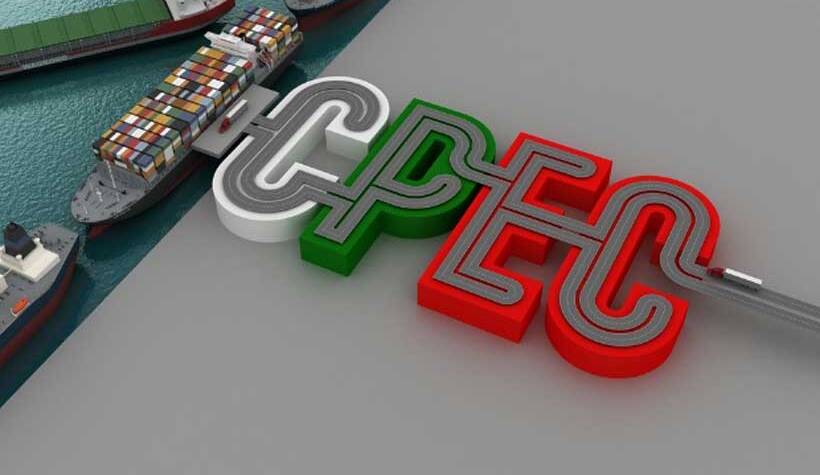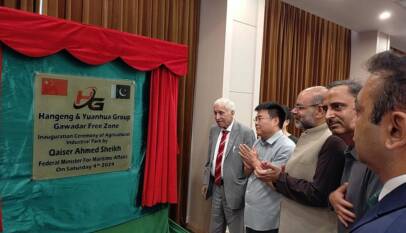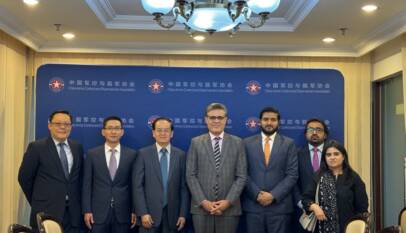China, Pakistan jointly promote high-quality development of CPEC
The China-Pakistan Economic Corridor (CPEC), stretching from the Hargoolun Range in the north to the Arabian Sea in the south, has brought significant transformation to Pakistan. Infrastructure projects such as the Havelian-Thakot highway and Sukkur-Multan motorway have greatly improved transportation safety and efficiency, reducing travel times and post-harvest losses for agricultural products. The Gwadar Port has expanded its services, stimulating local economic development. Energy cooperation under CPEC has addressed Pakistan’s power shortage, with projects like the Matiari-Lahore transmission line enhancing the national grid’s stability. Hydropower projects like Karot contribute to cleaner energy and ecological conservation. The CPEC has also fostered local talent and improved public transportation, exemplified by the success of the Orange Line Metro Train project in Lahore. As CPEC enters a new stage, the focus is on high-quality development, including the construction of industrial parks, fostering foreign investment, job creation, and accelerating Pakistan’s industrialization.
China-Pakistan Economic Corridor (CPEC), which runs through Pakistan from the lofty Hargoolun Range in the north all the way south to the Arabian Sea along the southern boundary of the country, is bursting with vitality.
Under the CPEC, flat and straight roads, lively ports, green and clean energy projects as well as industrial parks in the pipeline have brought great changes to Pakistan.
Islar, a Pakistani trucker, always drives along the Karakoram Highway (KKH) Phase-II (Havelian-Thakot Section), a project built in Pakistan under the framework of the CPEC.
The road conveys people’s expectation of a good life, said Islar, who believes that it leads to both safety and prosperity.
In the past the road between Havelian and Thakot was a narrow, steep and accident-prone path winding among the towering mountains in northwestern Pakistan. It took truckers nearly six hours to get to Thakot from Havelian.
The difficulty has been effectively solved by the 118-kilometer-long Havelian-Thakot highway. With 105 mainline bridges, 11 pedestrian bridges, 464 culverts and six tunnels built along its route, the wide and smooth highway has cut the one-way driving time to less than two hours, significantly increasing transportation safety and efficiency.
As the Sukkur-Multan section of the Peshawar-Karachi Motorway in Pakistan, also an infrastructure project along the CPEC, officially opened to traffic, the north-south traffic artery in central Pakistan was opened, and the transportation conditions of Multan, which is known for its mangoes, have been greatly improved.
The Sukkur-Multan motorway has shortened the time needed for mangoes to be transported from Multan to Sukkur from 11 hours to about 4 hours, substantially reducing the loss of agricultural products during transportation.
It has also helped Multan attract investments from companies. Since preparations for a highly anticipated fruit juice concentrate plant in the region have been started recently, local mango growers will no longer need to worry about the sale and transportation of their fruits.
The Gwadar Port, a flagship project of the CPEC, has witnessed new achievements. Since last year, the port has expanded its business scope, launching the Afghan cargo transit service systematically for the first time, providing liquefied petroleum gas-related services for the first time and realising commercial operation for the first time, infusing fresh impetus and vitality into local economic development.
Meanwhile, more CPEC projects concerning people’s well-being, including the New Gwadar International Airport and Gwadar hospital, are being advanced in an orderly manner.
The interconnection of transportation infrastructure has stimulated the internal vitality of Pakistan’s economy, society, and various fields concerning people’s well-being, noted Pakistan’s Minister for Planning, Development and Special Initiatives.
Pakistan and China will strengthen cooperation to drive larger-scale investment in Pakistan and accelerate the development of Pakistan’s economy, he added.
Besides transportation infrastructure construction, China-Pakistan energy cooperation has also progressed rapidly under the CPEC in recent years, easing Pakistan’s development bottleneck triggered by power shortage and introducing new ideas, technologies and investments for Pakistan’s exploration of clean energy.
In the vast Gobi desert in south-western Pakistan, a row of power transmission towers are extending into the distance. They are part of the ±660kVMatiari-Lahore high-voltage (HV) direct current (DC) transmission line, a CPEC project in Pakistan.
Adopting the world’s most advanced DC transmission technology, the project, which was officially put into commercial operation in September 2021, is a power transmission project with the highest voltage level, the largest transmission capacity and the longest transmission distance in Pakistan.
It is believed that the project helps improve the stability and transmission capacity of Pakistan’s national grid and further boost the country’s power supply.
In November 2021, the Karot Hydropower Project in Pakistan, the first CPEC hydropower investment project, successfully closed the gates of the diversion tunnels and started reservoir impoundment, paving the way for the wet testing of the generator units.
“Over years of construction of the hydropower project, the surrounding mountains have become greener and waters clearer. The project has not only made our life more convenient, but effectively advanced ecological conservation,” said Haider, a relocated resident at the reservoir region of the hydropower project.
“Everyone is looking forward to the operation of the project as early as possible, and hopes that it can bring cleaner and cheaper electricity,” he said.
With the advances in the project, the lower reaches of the Jhelum River basin, where the hydropower station is located, will witness improvement in irrigation efficiency and shipping conditions as well as reduction in the frequency of floods and droughts.
Up to now, the total installed capacity of wind power projects completed under the framework of the CPEC has reached 300,000 kWh, and that of CPEC solar projects has amounted to 400,000 kWh.
Meanwhile, the construction of the Karot Hydropower Project and the Suki Kinari Hydropower Project is proceeding steadily; and the Kohala Hydropower Project has already completed the signing of four major franchise agreements and will begin construction soon.
During the planning, construction, and operation of CPEC projects, Chinese companies have actively recruited local people and promoted localised management of them. Relevant companies have not only provided technical lectures and training courses for Pakistani employees, but also made efforts to strengthen communication between Chinese employees and their Pakistani colleagues so as to help them understand each other better. Thanks to the efforts, a significant increase has been achieved in their work efficiency.
On Oct 25, 2021, Nisar, a subway driver, steered the last train of the day steadily into the platform, bringing the first year of the operation of the Orange Line Metro Train project in Lahore city, Pakistan, to a perfect end.
“The Orange Line has changed the life of Lahore citizens, especially mine. I’m really honoured to be a cog in the machine, for which I must take on due responsibilities,” Nisar said.
Over the past year or so, the automated rapid transit line has transported more than 20 million passengers and registered a cumulative mileage of more than 12 million kilometres.
In addition, a group of local transportation management talents and technicians have continuously improved their capabilities, becoming the backbone force for the operation of the project.
As the CPEC construction enters a new stage of high-quality development, local talents that have acquired new skills are expected to better promote the construction of industrial parks and help build an industrial and manufacturing centre for Pakistan, according to a Pakistani official.
At present, Pakistan is making preparations for the construction of industrial parks in the country, including the Rashakai Special Economic Zone by leveraging the infrastructure development and talent cultivation results under the CPEC framework. These industrial parks will certainly attract more foreign investment, create a large number of jobs for local people, and speed up Pakistan’s industrialization process, he pointed out.
Pakistan’s sesame seed export to China jumps by 29%
Pakistan’s Sesame seeds export to China crossed $10.37 million from January to March of 20…












